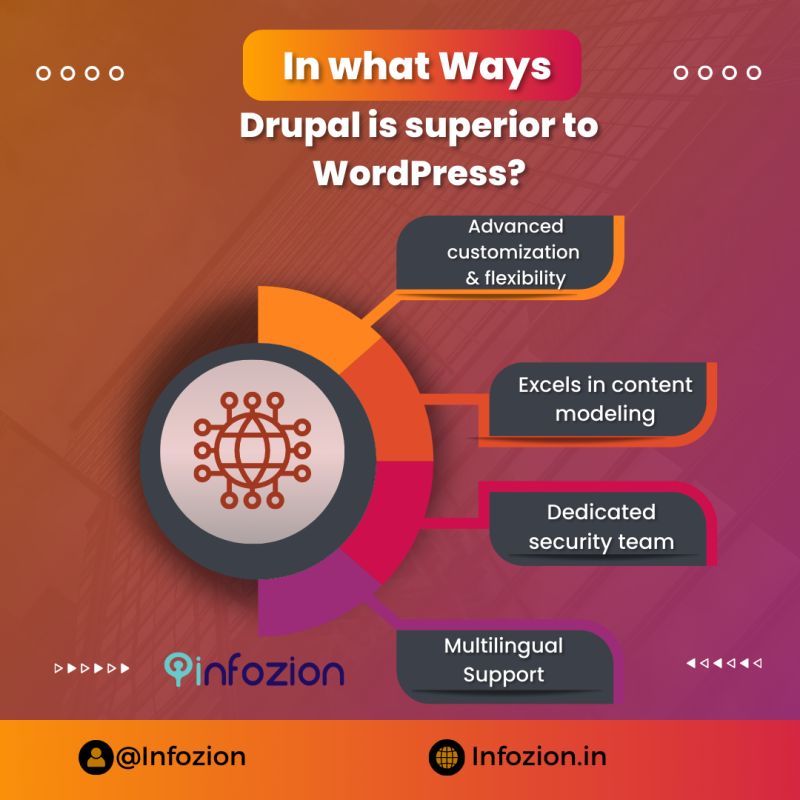What are the advantages of using Drupal in 2024?

What are the advantages of using Drupal in 2024?
In the ever-evolving landscape of web development, Content Management Systems (CMS) play a pivotal role in empowering users to create, manage, and publish digital content effectively. Among the plethora of CMS options available, Drupal stands out as a powerful and versatile platform with numerous advantages. In this comprehensive exploration, we’ll delve into the advantages of using Drupal in 2024, highlighting its flexibility, scalability, security, community support, and more.
1. Flexibility: Drupal offers unparalleled flexibility, allowing users to build diverse types of websites tailored to their specific needs and requirements. Whether it’s a personal blog, corporate website, e-commerce store, or community portal, Drupal provides the advantages of using Drupal in 2024 and the tools and features necessary to create custom solutions. Its modular architecture and flexible content modeling enable users to create and manage various types of content, including articles, blog posts, multimedia assets, and user-generated content.
2. Scalability: Scalability is a crucial consideration for websites expecting high traffic volumes and demanding workloads. Drupal excels in scalability, capable of handling large amounts of content and traffic without compromising performance. Its optimized database queries, caching mechanisms, and scalable infrastructure make it suitable for websites experiencing rapid growth and expansion. From small businesses to enterprise-level applications, Drupal scales seamlessly to meet the evolving needs of websites of all sizes.
3. Security: Security is paramount in safeguarding websites against potential threats and vulnerabilities. Drupal has a strong focus on security, with a dedicated security team actively monitoring and addressing vulnerabilities. Regular security updates and patches are released to ensure the platform remains secure and resilient against emerging threats. Additionally, Drupal’s robust permission and access control system, coupled with its secure coding practices, enhances the overall security posture of websites built on the platform.
4. Extensibility: Drupal’s extensibility is one of its key strengths, offering users a vast ecosystem of modules, themes, and distributions to extend and enhance its functionality. With thousands of contributed modules available, users can easily integrate additional features and functionalities into their Drupal websites without the need for custom development. Whether it’s adding e-commerce capabilities, social networking features, or advanced content management tools, Drupal’s extensible architecture empowers users to create tailored solutions that meet their unique requirements.
5. Community Support: Drupal boasts a large and vibrant community of developers, designers, site builders, and enthusiasts who contribute to its growth and success. The Drupal community provides extensive support, documentation, tutorials, and resources to help users get started with Drupal and overcome any challenges they may encounter along the way. Community-driven events such as Drupal Cons, meetups, and local user groups offer opportunities for networking, learning, and collaboration, fostering a sense of camaraderie and shared knowledge within the Drupal ecosystem.
6. Multilingual Capabilities: Drupal offers robust multilingual capabilities, making it easy to create and manage websites in multiple languages. Whether it’s translating content, configuring language settings, or implementing language-specific workflows, Drupal offers the benefits of using Drupal in 2024 and tools and features to support multilingual websites. Its built-in translation management system and language detection capabilities streamline the process of creating and maintaining multilingual content, enabling users to reach a global audience effectively.
7. Content Management Features: Drupal provides powerful content management features, including customizable content types, taxonomies, and views, allowing users to organize and manage their content effectively. Its flexible content modeling enables users to create structured content with defined fields and relationships, facilitating content reuse and consistency across the website. Additionally, Drupal’s revision control system enables users to track and manage content revisions, ensuring version control and editorial oversight.
8. SEO-Friendly: Drupal is designed with search engine optimization (SEO) in mind, with built-in features and best practices to help websites rank well in search engine results. Its clean URL structures, customizable metadata, and responsive design ensure optimal visibility and accessibility across various devices and platforms. Additionally, Drupal’s SEO modules and plugins offer additional tools and functionalities to optimize website performance, monitor analytics, and improve search engine rankings.
In conclusion, Drupal offers a myriad of advantages in 2024 that make it a preferred choice for building powerful and versatile websites. Its flexibility, scalability, security, extensibility, community support, multilingual capabilities, content management features, and SEO-friendliness set it apart as a robust and reliable CMS solution. Whether it’s creating a simple blog or a complex enterprise-level application, Drupal empowers users to unleash their creativity and build innovative digital experiences that engage and inspire audiences worldwide.





